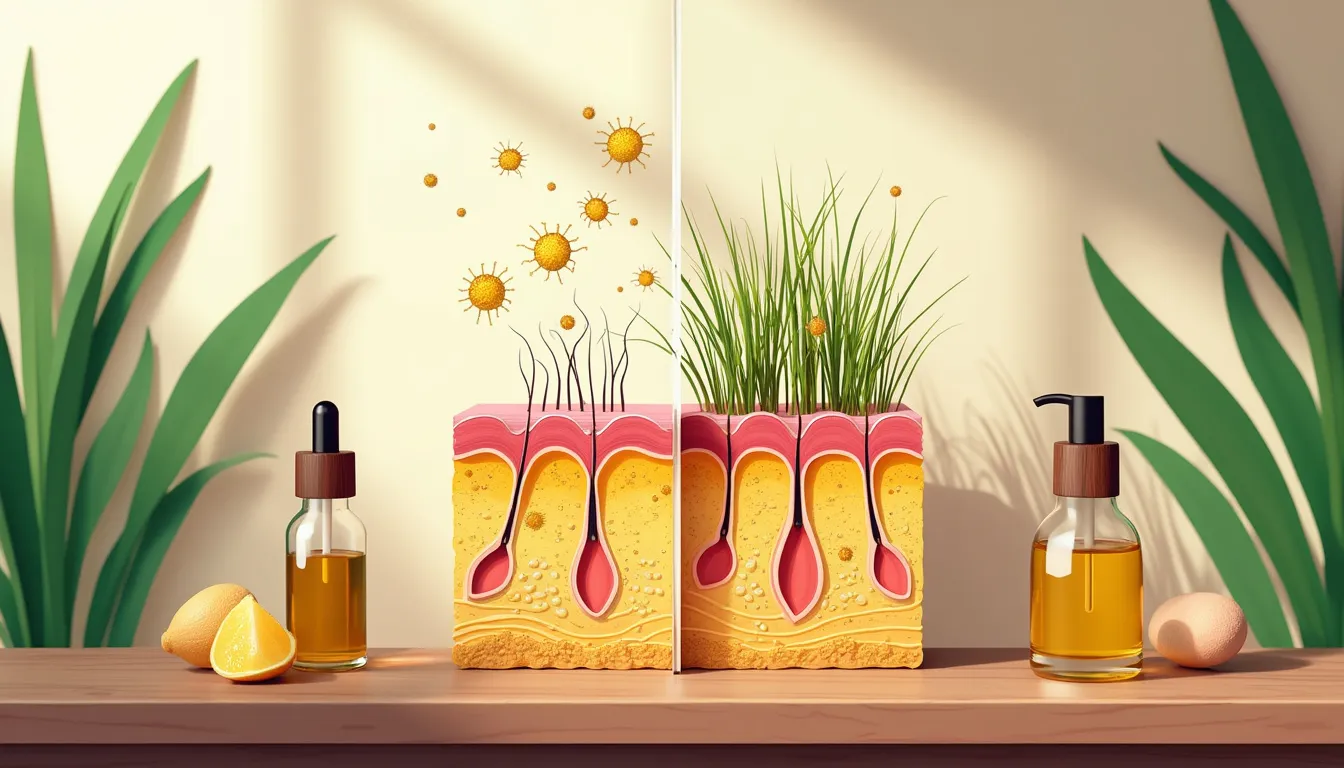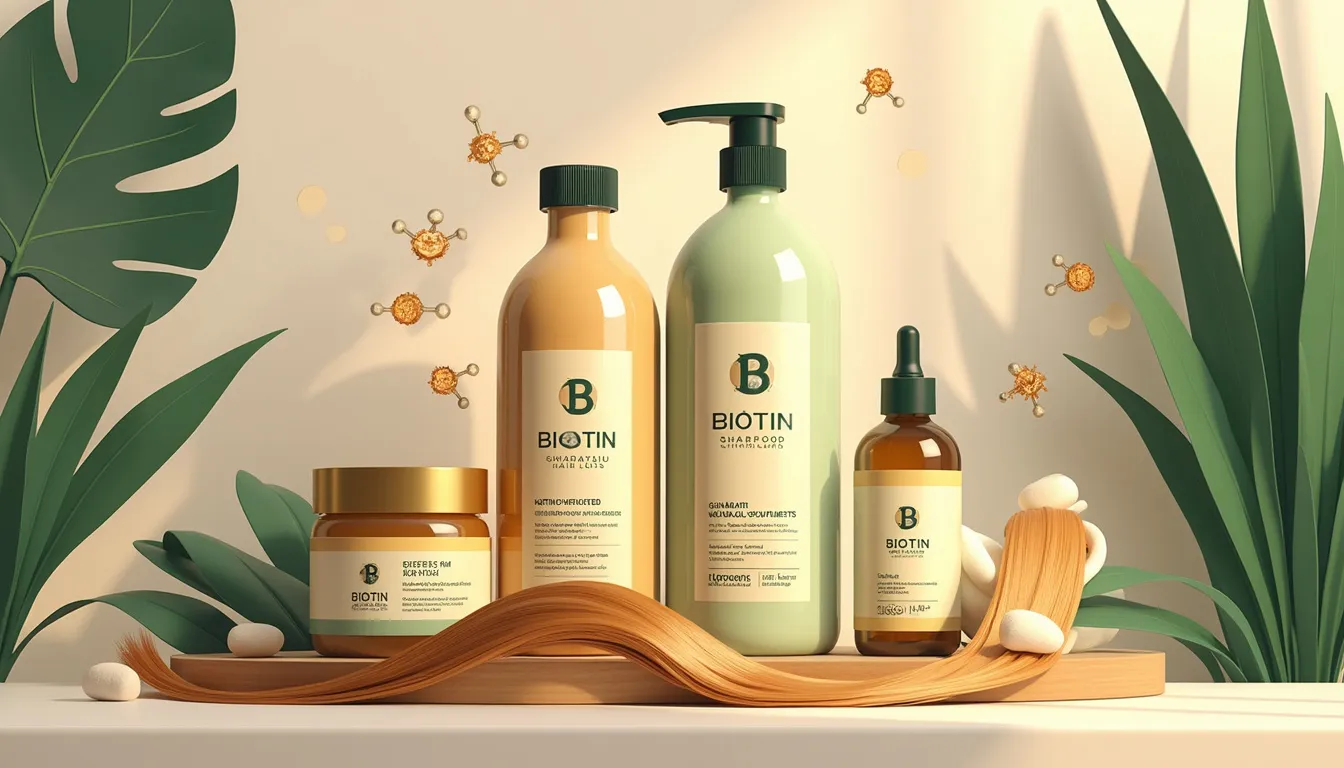Are you tired of seeing more hair in your brush than on your head? You’re not alone. Hair loss affects millions of people worldwide, leading many to search for effective solutions. Enter biotin, a B-vitamin that’s been making waves in the hair care industry. But is biotin for hair loss really the miracle cure some claim it to be? In this comprehensive guide, we’ll dive deep into the world of biotin and its potential role in combating hair loss. From understanding what biotin is and how it affects hair growth to exploring scientific studies and practical ways to incorporate it into your hair care routine, we’ve got you covered. Whether you’re experiencing thinning hair, a receding hairline, or just want to maintain your luscious locks, this article will provide you with valuable insights into how biotin might be the key to unlocking healthier, fuller hair. So, grab a cup of coffee, settle in, and let’s unravel the mystery of biotin for hair loss together.
Understanding Biotin and Its Role in Hair Health
What is Biotin?
Biotin, also known as vitamin B7 or vitamin H, is a water-soluble B-complex vitamin that plays a crucial role in various bodily functions. This essential nutrient has gained significant attention in recent years, particularly for its potential benefits in promoting hair health and combating hair loss. But what exactly is biotin, and why is it so important for our bodies?
At its core, biotin is a coenzyme that helps our bodies metabolize fats, carbohydrates, and proteins. It’s involved in numerous biochemical reactions, including the production of glucose and fatty acids. These processes are vital for maintaining healthy skin, nails, and, most notably, hair.
Interestingly, the term biotin is derived from the ancient Greek word biotos, which means life or sustenance. This name is fitting, given the vitamin’s essential role in cellular energy production and the maintenance of various bodily functions.
How Biotin Affects Hair Growth
When it comes to hair health, biotin’s role is multifaceted. Here’s how this vital nutrient contributes to hair growth and maintenance:
- Keratin production: Biotin is a key player in the production of keratin, the primary protein that makes up hair, skin, and nails. By supporting keratin infrastructure, biotin helps maintain the strength and integrity of hair strands.
- Cellular energy: As a coenzyme in energy metabolism, biotin helps fuel the rapid cell division in hair follicles, which is essential for hair growth.
- Nutrient metabolism: By aiding in the metabolism of fats and proteins, biotin ensures that hair follicles receive the nutrients they need to function optimally.
- Scalp health: Biotin contributes to maintaining a healthy scalp environment, which is crucial for robust hair growth.
While the exact mechanisms are still being studied, research suggests that biotin may help improve the keratin infrastructure of hair. This could potentially lead to stronger, thicker hair strands and reduced hair shedding.
It’s important to note that while biotin is often touted as a miracle solution for hair loss, its effectiveness can vary from person to person. Factors such as overall health, diet, and the underlying cause of hair loss can all influence how well biotin works for an individual.
Recommended Daily Intake of Biotin
Determining the optimal daily intake of biotin can be a bit tricky, as requirements can vary based on age, gender, and overall health status. However, there are general guidelines that can help ensure you’re getting enough of this important nutrient.
The adequate intake (AI) for biotin, as established by the Food and Nutrition Board of the National Academies of Sciences, Engineering, and Medicine, are as follows:
- Infants 0-6 months: 5 mcg
- Infants 7-12 months: 6 mcg
- Children 1-3 years: 8 mcg
- Children 4-8 years: 12 mcg
- Children 9-13 years: 20 mcg
- Adolescents 14-18 years: 25 mcg
- Adults 19 years and older: 30 mcg
- Pregnant women: 30 mcg
- Breastfeeding women: 35 mcg
It’s worth noting that these are considered adequate intake levels for general health, not specifically for hair growth. Some proponents of biotin for hair loss suggest higher doses, sometimes ranging from 2,000 to 5,000 mcg per day. However, it’s crucial to consult with a healthcare professional before starting any high-dose supplement regimen.
Interestingly, biotin deficiency is relatively rare in individuals who consume a balanced diet. This is because many common foods contain biotin, and the bacteria in our gut can produce small amounts of this vitamin. However, certain factors can increase the risk of biotin deficiency, including:
- Prolonged use of certain anticonvulsant medications
- Excessive consumption of raw egg whites (which contain a protein that interferes with biotin absorption)
- Certain genetic disorders that affect biotin metabolism
- Chronic alcohol use
- Pregnancy and breastfeeding (which can increase biotin requirements)
For those considering biotin supplementation for hair loss, it’s important to remember that more isn’t always better. While biotin is generally considered safe, even in high doses, excessive intake can interfere with certain laboratory tests, potentially leading to false results. Additionally, very high doses of biotin may cause minor side effects such as nausea, cramping, or diarrhea in some individuals.
In conclusion, biotin plays a vital role in hair health, contributing to the production of keratin and supporting the overall function of hair follicles. While the recommended daily intake is sufficient for most people, those experiencing hair loss might consider higher doses under the guidance of a healthcare professional. As with any supplement, it’s essential to approach biotin use thoughtfully, considering your individual health needs and consulting with a doctor before making significant changes to your diet or supplement routine.

The Science Behind Biotin for Hair Loss
As the popularity of biotin for hair loss continues to grow, it’s crucial to examine the scientific evidence supporting its efficacy. While anecdotal success stories abound, let’s dive into what research has to say about this B-vitamin and its potential to combat hair loss.
Clinical Studies on Biotin and Hair Growth
Several clinical studies have explored the relationship between biotin and hair growth, with mixed results. Here’s a breakdown of some key findings:
- A 2015 study published in the Journal of Cosmetic Dermatology found that women with thinning hair who took a marine protein supplement containing biotin for 90 days experienced significant hair growth and reduced shedding.
- Another study from 2017, published in Skin Appendage Disorders, examined the efficacy of a biotin-containing oral marine protein supplement in women with self-perceived thinning hair. The results showed improved hair growth and quality after 90 days of supplementation.
- However, a 2017 review in Skin Appendage Disorders concluded that while biotin supplementation may be helpful for brittle nail syndrome, there’s a lack of sufficient evidence for its use in hair loss treatment.
While these studies offer promising insights, it’s important to note that more extensive research is needed to definitively prove biotin’s effectiveness for hair loss in all populations.
Biotin Deficiency and Its Impact on Hair
Biotin deficiency, although rare, can have a significant impact on hair health. When the body lacks sufficient biotin, it can lead to various symptoms, including:
- Thinning hair
- Hair breakage
- Hair loss (alopecia)
- Dry, scaly skin
- Brittle nails
Dr. Wilma Bergfeld, a dermatologist at Cleveland Clinic, explains, Biotin deficiency can cause hair loss, skin rashes, and brittle nails. While it’s rare, certain factors can increase the risk of deficiency, such as pregnancy, long-term use of certain medications, and some genetic disorders.
It’s worth noting that true biotin deficiency is uncommon in developed countries due to its widespread presence in many foods. However, subclinical deficiencies may be more prevalent and could potentially contribute to hair thinning or loss.
Potential Benefits of Biotin Supplementation
While the jury is still out on biotin’s direct impact on hair growth for those without a deficiency, there are several potential benefits associated with biotin supplementation:
- Improved Hair Structure: Biotin is essential for the production of keratin, a protein that makes up the structure of hair. Adequate biotin levels may help strengthen hair strands, potentially reducing breakage and improving overall hair appearance.
- Enhanced Nutrient Metabolism: Biotin plays a crucial role in metabolizing fats, proteins, and carbohydrates. This improved nutrient metabolism may indirectly support hair health by ensuring the body has the necessary building blocks for hair growth.
- Increased Hair Thickness: Some studies suggest that biotin supplementation may increase the diameter of individual hair strands, giving the appearance of fuller, thicker hair.
- Support for Other Hair-Healthy Nutrients: Biotin works synergistically with other nutrients important for hair health, such as vitamin B5 (pantothenic acid) and vitamin B12. Ensuring adequate biotin levels may help optimize the function of these complementary nutrients.
Dr. Shani Francis, a board-certified dermatologist specializing in hair loss, notes, While biotin isn’t a miracle cure for hair loss, it can be a valuable part of a comprehensive hair health strategy, especially for those with nutritional deficiencies or certain medical conditions.
It’s important to remember that while biotin supplementation may offer these potential benefits, individual results can vary. Factors such as overall health, diet, genetics, and the underlying cause of hair loss all play a role in determining the effectiveness of biotin for hair growth.
The Bottom Line on Biotin for Hair Loss
While the scientific evidence supporting biotin for hair loss is not conclusive, there’s enough promising research to warrant consideration, especially for those with known deficiencies or as part of a broader hair health strategy. As with any supplement, it’s crucial to consult with a healthcare professional before starting biotin supplementation, particularly if you’re dealing with significant hair loss.
For those looking to explore comprehensive hair loss solutions beyond biotin, consider checking out the Fortify program. This innovative approach combines cutting-edge research with personalized strategies to help combat hair loss and promote healthier, fuller hair.
Remember, addressing hair loss often requires a multifaceted approach. While biotin may play a role, it’s essential to consider other factors such as diet, stress management, and overall health in your quest for a fuller head of hair.

III. Incorporating Biotin into Your Hair Care Routine
Now that we’ve explored the potential benefits of biotin for hair loss, let’s dive into practical ways to incorporate this essential vitamin into your daily hair care regimen. By understanding dietary sources, supplementation options, and how to combine biotin with other treatments, you can create a comprehensive approach to combat hair loss and promote healthier, fuller hair.
A. Dietary Sources of Biotin
While biotin supplements are widely available, it’s always best to start with a balanced diet rich in natural sources of this vitamin. Here are some biotin-rich foods you can easily add to your meals:
- Eggs: Especially egg yolks, which are one of the richest sources of biotin
- Nuts and seeds: Almonds, peanuts, walnuts, and sunflower seeds
- Organ meats: Liver and kidney
- Fish: Salmon, tuna, and sardines
- Avocados: A delicious and versatile source of biotin
- Sweet potatoes: Rich in biotin and other hair-healthy nutrients
- Legumes: Soybeans, lentils, and peanuts
Incorporating these foods into your diet can help ensure you’re getting a natural dose of biotin. However, it’s important to note that cooking can reduce biotin content, so consider consuming some of these foods raw or lightly cooked when possible.
B. Biotin Supplements: Dosage and Safety
For those looking to boost their biotin intake beyond dietary sources, supplements are a popular option. When considering biotin supplements for hair loss, keep the following points in mind:
- Dosage: The recommended daily intake of biotin for adults is 30 micrograms (mcg). However, many supplements offer much higher doses, ranging from 1,000 to 10,000 mcg. While biotin is generally considered safe even at high doses, it’s best to consult with a healthcare professional before starting any new supplement regimen.
- Safety: Biotin is water-soluble, meaning excess amounts are typically excreted in urine. This makes biotin toxicity rare. However, high doses of biotin can interfere with certain lab tests, particularly those measuring thyroid function and hormone levels. Always inform your doctor if you’re taking biotin supplements before undergoing any blood tests.
- Form: Biotin supplements come in various forms, including tablets, capsules, gummies, and liquids. Choose a form that’s convenient for you to take regularly.
- Quality: Look for supplements from reputable manufacturers that undergo third-party testing for purity and potency.
It’s worth noting that while biotin supplements are generally well-tolerated, some people may experience mild side effects such as nausea or digestive upset. If you experience any adverse reactions, discontinue use and consult your healthcare provider.
C. Combining Biotin with Other Hair Loss Treatments
While biotin can be beneficial for hair health, it’s often most effective when used as part of a comprehensive hair loss treatment plan. Here are some ways to combine biotin with other strategies for optimal results:
- Minoxidil: This FDA-approved topical treatment can be used alongside biotin supplements. While biotin works from the inside out, minoxidil stimulates hair follicles externally. Research has shown that minoxidil can be effective in treating pattern baldness.
- Scalp care: Maintain a healthy scalp environment by using gentle, sulfate-free shampoos and conditioners. Some products even contain biotin as an ingredient, providing an extra boost.
- Stress management: Chronic stress can contribute to hair loss. Incorporate stress-reduction techniques like meditation, yoga, or regular exercise into your routine.
- Other supplements: Consider adding other hair-healthy nutrients to your regimen, such as iron, zinc, and vitamins D and E. Always consult with a healthcare provider before starting any new supplement combination.
- Scalp massages: Regular scalp massages can increase blood flow to hair follicles, potentially enhancing the delivery of nutrients like biotin to the scalp.
Remember, consistency is key when it comes to any hair loss treatment. It may take several months to see noticeable results, so patience is essential. Keep track of your progress by taking regular photos and noting any changes in hair thickness, growth rate, or overall appearance.
For those looking for a comprehensive approach to hair loss prevention, consider exploring the Fortify program. This program offers a holistic strategy to combat hair loss, potentially complementing your biotin regimen for enhanced results.
In conclusion, incorporating biotin into your hair care routine can be a valuable step in addressing hair loss concerns. By combining dietary sources, supplements (if appropriate), and other proven hair loss treatments, you can create a comprehensive strategy to promote healthier, stronger hair. As with any health-related changes, it’s always best to consult with a healthcare professional or trichologist to develop a personalized plan that addresses your specific needs and concerns.
In conclusion, biotin has emerged as a promising potential solution for those struggling with hair loss. While the scientific evidence is not yet conclusive, there are compelling reasons to consider incorporating biotin into your hair care routine. Its role in promoting healthy hair growth, coupled with its safety profile and accessibility, makes it an attractive option for many.
However, it’s important to remember that biotin is not a magic bullet for hair loss. Its effectiveness may vary from person to person, and it works best as part of a comprehensive approach to hair health. This approach should include a balanced diet rich in essential nutrients, proper hair care practices, and addressing any underlying health issues that may be contributing to hair loss.
If you’re considering biotin supplementation, it’s crucial to consult with a healthcare professional first. They can help determine if you have a biotin deficiency and guide you on the appropriate dosage. Remember, more is not always better, and excessive biotin intake can interfere with certain medical tests.
For those looking to take a proactive stance against hair loss, biotin could be a valuable addition to your regimen. Whether through dietary sources or supplements, ensuring adequate biotin intake may contribute to healthier, stronger hair. However, patience is key – visible results may take several months to appear.
Ultimately, while biotin shows promise in the fight against hair loss, it’s just one piece of the puzzle. A holistic approach that combines proper nutrition, stress management, and targeted treatments will likely yield the best results. As research in this field continues to evolve, we may gain even more insights into how biotin and other nutrients can be leveraged to combat hair loss effectively.
If you’re serious about addressing hair loss and want to explore a comprehensive solution, consider checking out the Fortify program at hairsecurity.net/fortify. This program offers a multifaceted approach to hair loss prevention and treatment, potentially complementing the benefits of biotin and other hair health strategies.
